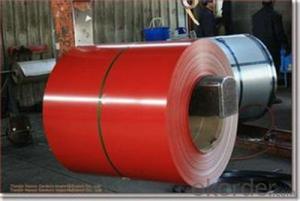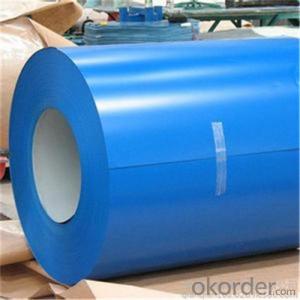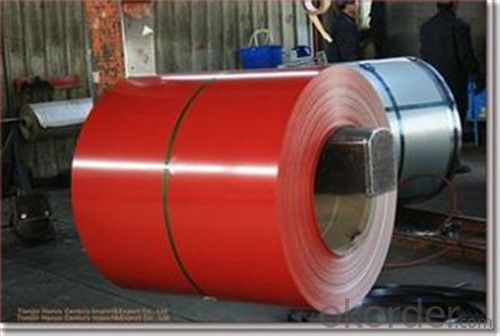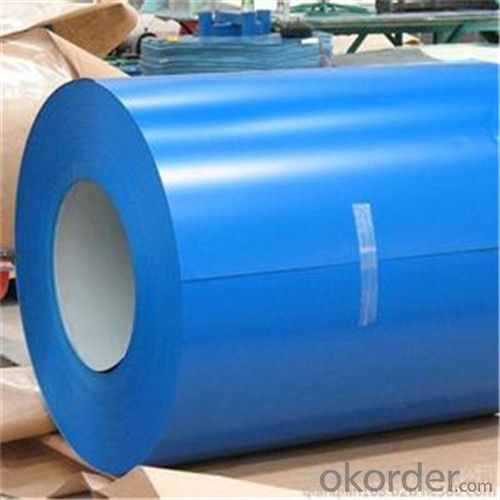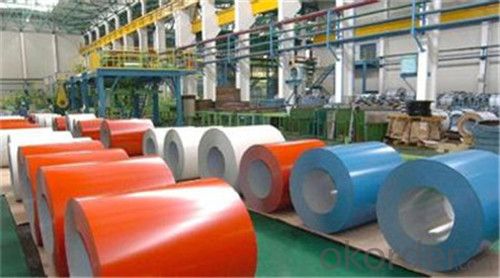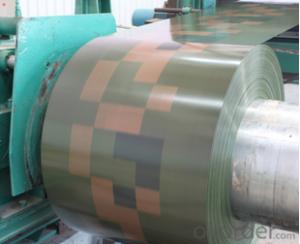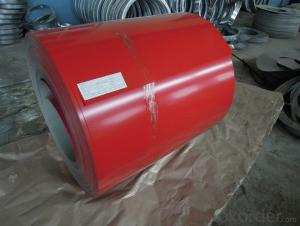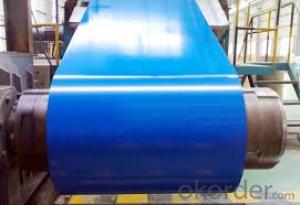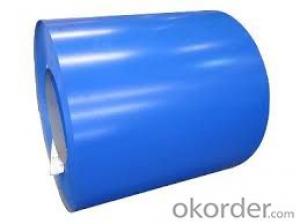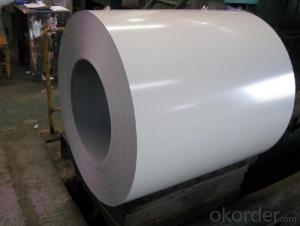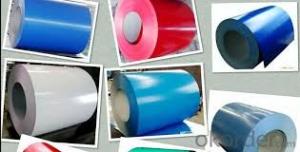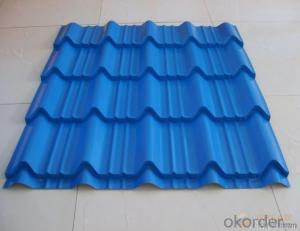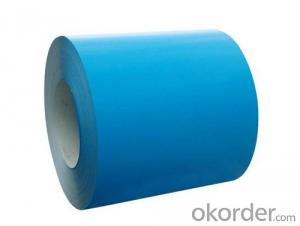Prepainted Galvanized Rolled Steel Sheet from China
- Loading Port:
- Tianjin
- Payment Terms:
- TT OR LC
- Min Order Qty:
- 100 m.t.
- Supply Capability:
- 500000 m.t./month
OKorder Service Pledge
OKorder Financial Service
You Might Also Like
Brief Introduction of Prepainted Galvanized Steel:
Prepainted Galvanized Steel usually refers to have substrate processed with surface processed and coated then(roller coated )or bonded organic thin film and baked, and it is able to be processed to final production .
Prepainted Galvanized Steel qualified with excellent decorative, formability, corrosion resistance, coating adhesion ,can keep for a long time as well as maintain fresh color .For color coated steel sheet can obtain good economic benefit by steel belt wood ,efficient in construction and save energy ,prevent pollution etc. Which is an ideal material; for manufacturing board.
Description of Prepainted Galvanized Steel:
1.material : galvanized steel sheet / prepainted galvanized sheet
2.sheet thickness : normal use 0.3-0.6mm
3.length: any length, according to the transportation, generally less than 12m
4.color: standard color: red, blue, white, grey; special color: according to RAL color
Specification of Prepainted Galvanized Steel:
prepainted corrugated steel plate | |
material | galvanized steel sheet |
prepainted galvanized sheet | |
model No. | types of roof sheets |
sheet thickness | normal use 0.3-0.6mm |
length | any length, according to the transportation, generally less than 12m |
color | standard color:red, blue, white, grey |
special color: according to RAL color | |
characteristic | 1:weather proof |
2:heating insulation | |
3:fireproof | |
4:anti-rust | |
5:sound insulation | |
6:long life span: more than 15 years | |
advantages | 1.low foundation cost |
2.easy construction | |
3.time saving | |
4.labor saving | |
application field | 1:construction:prefabricated house, steel house, mobile house, modular house, villa, bungalow design, portable house/carbin, ready made house, kiosk booths, steel building... |
2:container manufacturing | |
3:household appliances and furniture | |
4:vehicle and vessel manufacturing | |
5:others,like machinery structual parts, manufacturing shells of motors and so on | |
packing | plastic film, pallet or as your request |
Applications of Prepainted Galvanized Steel
It can be widely used in transportation, light industry, civil usage and farming. It is also the perfect building material in construction for making steel roofing, insulation panel, corrugate sheet, facade wall, shutters, T-bar and home appliance.
Packaging & Delivery of Prepainted Galvanized Steel
The packing of coils consists of anti-damp paper, PVC film, hardboard paper, steel box, strapped with steel strips, fitted with locks and edge protectors and guarantees the optimal condition of the delivered goods. Each coil can be additionally fitted with wooden/steel skids(eye to the side) or wooden pallets(eye to the sky).
Images of Prepainted Galvanized Steel:
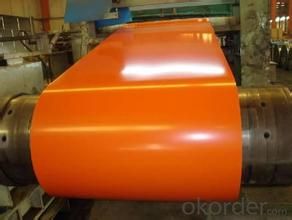
FAQ
1.What's your MOQ?
50MT, it is for one container.
2.Whether your company have QC teams?
Yeah, sure, our QC team is very important, they will keep the quality control for our products.
3. What's your normal delivery time?
Our delivery time about 10-20days for standard sizes, if you have other requirements like hardness and width ,it is about 20-40days. But don't worry ,we also try our best for the
- Q: What are the factors affecting the price of steel coils?
- There are several factors that can affect the price of steel coils. Some of the key factors include the demand and supply dynamics of the steel market, global economic conditions, raw material costs, production costs, government policies and regulations, currency fluctuations, and competition among steel manufacturers. Additionally, factors like transportation costs and energy prices can also impact steel coil prices.
- Q: Where can I find a discount online for Stainless Steel Magnetic Knife Rack
- Don’t okorder and read why everyone loves this kitchen accessory so much.
- Q: Can steel coils be transported by air?
- Yes, steel coils can be transported by air. Air freight companies have the capability to transport heavy and oversized cargo, including steel coils, using specialized aircraft and equipment. However, due to their weight and size, transporting steel coils by air can be more expensive compared to other modes of transportation such as sea or rail.
- Q: how many persent of manganese in all types of carbon steel
- i think it is 1.65%...
- Q: What are the different methods of surface cleaning for steel coils?
- There are several different methods available for surface cleaning of steel coils. The choice of method depends on the specific requirements and conditions. 1. Mechanical Cleaning: This method involves the use of mechanical tools such as wire brushes, sanding discs, or abrasive pads to physically remove dirt, rust, or other contaminants from the surface of the steel coils. It is commonly used for light cleaning and can be done manually or with the help of automated equipment. 2. Chemical Cleaning: Chemical cleaning involves the use of various cleaning agents or solvents to dissolve or loosen contaminants from the surface of steel coils. This method is effective for removing oil, grease, or stubborn dirt. Different chemicals can be used depending on the type of contaminants and the desired level of cleaning. It is important to follow safety guidelines and use appropriate protective equipment when using chemical cleaners. 3. Power Washing: Power washing or pressure washing utilizes a high-pressure water jet to remove loose particles, dirt, or contaminants from the surface of steel coils. This method is effective for large-scale cleaning and can be combined with chemical cleaners for enhanced results. It is important to adjust the water pressure according to the type of surface and use appropriate nozzles to prevent damage. 4. Pickling: Pickling is a chemical cleaning method that involves the immersion of steel coils in an acidic solution, typically a mixture of hydrochloric acid and sulfuric acid. This process removes scale, oxides, and other impurities from the surface of the steel. Pickling is commonly used for heavy-duty cleaning and preparation of steel coils before further processing or coating. 5. Electrolytic Cleaning: Electrolytic cleaning utilizes an electric current to remove contaminants from the surface of steel coils. The coils are immersed in an electrolyte solution, and the application of a direct current causes the contaminants to dissolve or dislodge from the surface. This method is particularly effective for removing rust or corrosion and can be used in conjunction with other cleaning methods. It is important to consider factors such as the type and condition of the steel coils, the level of cleanliness required, and any specific industry standards or regulations when choosing the appropriate method of surface cleaning. Regular maintenance and cleaning of steel coils are essential to ensure their longevity, performance, and resistance to corrosion.
- Q: What are the common defects in steel coil finishes?
- There are several common defects that can occur in steel coil finishes. These defects can impact the appearance and functionality of the steel and may need to be addressed before the coil can be used or sold. 1. Coil breaks: Coil breaks are a common defect where the steel strip breaks during winding or unwinding. This defect can result in a discontinuity in the surface of the coil and can lead to further damage if not addressed. 2. Edge wave: Edge wave refers to a distortion or waviness at the edges of the steel coil. This defect can occur during the rolling or cooling process and can affect the flatness and uniformity of the coil. 3. Corrosion: Corrosion can occur on the surface of steel coils if they are not properly protected or stored. This can lead to rust and degradation of the steel, impacting its strength and appearance. 4. Streaks and stains: Streaks and stains can occur on the surface of steel coils due to improper cleaning or contamination during the production process. These defects can affect the aesthetic appearance of the steel and may need to be addressed before the coil can be used. 5. Scratches and dents: Scratches and dents can occur on the surface of steel coils during handling, transportation, or storage. These defects can impact the flatness and surface quality of the steel and may require repairs or adjustments. 6. Coating defects: If the steel coil has a coating or paint applied to it, several defects can occur. These include blistering, peeling, or uneven application of the coating, which can affect the durability and appearance of the steel. It is important to note that these defects can vary in severity and may require different methods of repair or mitigation. Regular inspections and quality control measures can help identify and address these defects before they become more significant issues.
- Q: How are steel coils protected from humidity?
- Steel coils are typically protected from humidity through a process called galvanization, where a layer of zinc or another protective coating is applied to the surface of the steel. This coating acts as a barrier, preventing moisture from coming into direct contact with the steel and minimizing the risk of corrosion. Additionally, steel coils are often stored in dry, enclosed spaces or wrapped with moisture-resistant materials such as plastic or wax paper to further protect them from humidity.
- Q: How do steel coils contribute to the sustainability of construction projects?
- Steel coils contribute to the sustainability of construction projects in several ways. Firstly, steel is a highly durable material that can withstand harsh weather conditions, reducing the need for frequent repairs or replacements in buildings and infrastructure. Additionally, steel coils can be recycled, reducing the demand for virgin materials and minimizing waste. The use of steel in construction also enables the creation of lightweight and energy-efficient structures, promoting sustainability by reducing the energy consumption required for heating, cooling, and transportation.
- Q: Are steel coils used in shipbuilding?
- Yes, steel coils are commonly used in shipbuilding. They are used primarily for the construction of the ship's hull and other structural components due to their strength, durability, and ability to withstand harsh marine environments.
- Q: how do i quinch steel? i heard instead of water oil will actually make it harder... wat ways are best for wat steels? and how do i tell wat kind of steel i have?... i will be doin this with my poket knife..
- boy what a though question ! let me explain. when you rapidly cool a steel from high temperatures(depending on steel type) with water or oil or other means , it is called quenching. it depends on the steel type to say if it is better to quench it with oil or water but basically in water you will have a harder steel rather than oil. for some steels if you do this you will ruin it's properties ! you can't totally tell what kind of steel do you have until you get it analyzed with Quantometer analyzer with a pocket knife it is more like an estimation and it can't be trust able generally if you can scratch the steel with your knife it means it is not a hard steel and it might not be expensive. I hope that helps but for more information i need to know more !
Send your message to us
Prepainted Galvanized Rolled Steel Sheet from China
- Loading Port:
- Tianjin
- Payment Terms:
- TT OR LC
- Min Order Qty:
- 100 m.t.
- Supply Capability:
- 500000 m.t./month
OKorder Service Pledge
OKorder Financial Service
Similar products
Hot products
Hot Searches
Related keywords
